|
|
|
Sort Order |
|
|
|
Items / Page
|
|
|
|
|
|
|
| Srl | Item |
| 1 |
ID:
148050
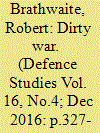

|
|
|
|
|
| Summary/Abstract |
The utilization of chemical weapons to quash domestic rebellion is a drastic action for a regime facing domestic challengers to take, especially given the reputation costs and risk of international intervention. However, recent developments have illustrated that some regimes have contemplated and implemented extraordinary measures (including the use of chemical munitions) to quash rebellion. This study addresses the question of why some states utilize chemical weapons against domestic challengers while others refrain from this level of state repression. I argue that the utilization of chemical weapons has both domestic and international elements. Specifically, that ethnic cleavages that lead to secessionist challenges and factors associated with inter-state rivalry impact the likelihood that a state utilizes the employment of chemical munitions. I test my argument and other explanations regarding repression with a casestudy approach utilizing captured Iraqi Government documents comparing Iraq’s Al-Anfal campaigns with developments during the recent Syrian Civil War.
|
|
|
|
|
|
|
|
|
|
|
|
|
|
|
|
| 2 |
ID:
188954
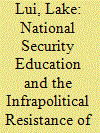

|
|
|
|
|
| Summary/Abstract |
This study highlights political parenting after the introduction of National Security Education (NSE) in Hong Kong amid waves of political repression after the anti-extradition movement in 2019–2020. Do parents conform to or resist the new nationalistic, China-focused education curriculum that is inconsistent with their ideals of parenting and children education? How do parents navigate these changes? Based on the interviews with 26 parent-stayers in Hong Kong, I uncover that beneath the public transcripts of compliance, there are low-profile forms of resistance through (1) political parenting—nurturance of acquiescent but critical thinkers and resistance to nationalization by preparing their children to embracing cosmopolitan values in pursuit of a migration dream and (2) parents’ anonymous attempts to break the silence by using other dominant but depoliticized discourses to reconfigure their resistance to NSE. In so doing, they avoid provoking the authorities, while continuing to resist. These hidden transcripts are drawn from the cultural repertoires of parenting and liberal democracy in the pre-National Security Law (NSL) period.
|
|
|
|
|
|
|
|
|
|
|
|
|
|
|
|
| 3 |
ID:
073592


|
|
|
| 4 |
ID:
137206
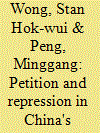

|
|
|
|
|
| Summary/Abstract |
China has established a petition system to elicit information about grievances. However, the petition system may have perverse effects because it also reveals to the center the failure of local-level officials to resolve those grievances. Anecdotal accounts suggest that local officials have incentive to silence petitioners, often with the use of repression. In this article we study whether non–regime threatening petitions would provoke local governments' coercive response. To tackle the endogenous relationship between petition and repression, we take advantage of a natural experiment afforded by a change in hydroelectricity policy in China. In particular, we use provincial hydropower outputs as an instrument to identify citizen petitions. We find that citizen petitions significantly increase a province's spending on its repressive apparatus. The results suggest a paradoxical outcome of China's petition system: while it may help reduce the national authority's use of repression, it has caused an explosion of repression within the authoritarian system as a whole.
|
|
|
|
|
|
|
|
|
|
|
|
|
|
|
|
| 5 |
ID:
045454


|
|
|
|
|
| Publication |
London, Komiteng Sambaayaanang, Philipino, 1980.
|
| Description |
xiv, 298p.pbk
|
| Standard Number |
0906968038
|
|
|
|
|
|
|
|
|
|
|
|
Copies: C:1/I:0,R:0,Q:0
Circulation
| Accession# | Call# | Current Location | Status | Policy | Location |
| 021128 | 959.904/PHI 021128 | Main | On Shelf | General | |
|
|
|
|
| 6 |
ID:
149518
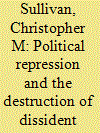

|
|
|
|
|
| Summary/Abstract |
How does repression influence overt, collective challenges directed against political authority? To date, answers to this question have been inconclusive. This article argues that recent works inadequately address the topic because the focus has been on repression's impact on local civilians, with less consideration of dissident organizations. The author develops an organizational theory of challenger development and specifies predictions for how repression's effects on dissent are contingent upon the types of organizational behaviors targeted for coercion. The analysis employs original, microlevel data collected from previously confidential Guatemalan National Police records to assess the effects of repression during the years 1975 to 1985. Results show that the effects of repression are more complex than previously imagined. When repression targets the clandestine activities necessary to develop and sustain dissident organizations, such as holding meetings, training participants, and campaigning for funds, dissent declines significantly. But when repression is directed at ongoing, overt, collective challenges, it motivates a backlash that escalates dissent. Implications are drawn for how political order and conflict are understood and studied.
|
|
|
|
|
|
|
|
|
|
|
|
|
|
|
|
| 7 |
ID:
190884


|
|
|
|
|
| Summary/Abstract |
This article investigates how and when regime transitions intensify minority discrimination through an analysis of two types of religious persecution following the Arab uprisings. We argue that weakened institutions and the prevalence of religious outbidding during political transitions make societal-based religious discrimination (SRD) more likely to increase than government-based religious discrimination (GRD). This is because social divisions are often exacerbated and social unrest difficult to contain, while at the same time, policy change can be difficult to enact and enforce. We test these claims through a mixed-methods research design. Employing a synthetic control method, the cross-national, quantitative analysis from 1990 to 2014 confirms that GRD has not changed since the Arab uprisings, while SRD has substantially increased in those countries (i.e. Egypt, Libya, and Tunisia) that also experienced regime change. A case study of Egypt provides more direct evidence of the institutional and outbidding mechanisms. The qualitative analysis draws on ethnographic research conducted in Cairo during 2014, which includes in-depth interviews with Coptic Orthodox Christians. Our findings underscore the twin challenge of protecting and accommodating minority religions during periods of political transition.
|
|
|
|
|
|
|
|
|
|
|
|
|
|
|
|
| 8 |
ID:
133022
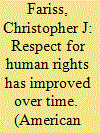

|
|
|
|
|
| Publication |
2014.
|
| Summary/Abstract |
According to indicators of political repression currently used by scholars, human rights practices have not improved over the past 35 years, despite the spread of human rights norms, better monitoring, and the increasing prevalence of electoral democracy. I argue that this empirical pattern is not an indication of stagnating human rights practices. Instead, it reflects a systematic change in the way monitors, like Amnesty International and the U.S. State Department, encounter and interpret information about abuses. The standard of accountability used to assess state behaviors becomes more stringent as monitors look harder for abuse, look in more places for abuse, and classify more acts as abuse. In this article, I present a new, theoretically informed measurement model, which generates unbiased estimates of repression using existing data. I then show that respect for human rights has improved over time and that the relationship between human rights respect and ratification of the UN Convention Against Torture is positive, which contradicts findings from existing research.
|
|
|
|
|
|
|
|
|
|
|
|
|
|
|
|
| 9 |
ID:
114676
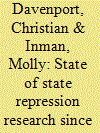

|
|
|
|
|
| Publication |
2012.
|
| Summary/Abstract |
Researchers have been exploring government repressive behavior for decades, but the greatest improvements have come in the last two. For example, greater theoretical specification has allowed us to determine a great deal about what repression is and why it occurs, while greater methodological sophistication has allowed us to test these theories rigorously. Despite or rather because of these advancements, however, we know comparatively little about what impact repression has on other social, economic, and political phenomena. This article reviews our general knowledge of the topic and attempts to improve our understanding of how repressive action influences behavioral challenges to governments.
|
|
|
|
|
|
|
|
|
|
|
|
|
|
|
|
| 10 |
ID:
163438
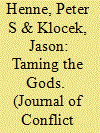

|
|
|
|
|
| Summary/Abstract |
Despite a robust literature on general forms of state repression, the determinants of religious repression remain unclear. This article argues that a regime’s experience with religious conflict will lead it to be more repressive of religious groups within its territory for three primary reasons. Religious conflict increases the behavioral threat posed by religious groups, lowers the cost of repressing these communities, and evokes vivid memories of past religious violence that underscore the role of the state in taming religion to maintain social order. New, cross-national data on religious conflict and repression from 1990 to 2009 show that religious conflict has a significant and positive effect on the level of religious repression for the time period under investigation, expanding the types and severity of government restrictions on religion in a country. Our findings point to the importance of studying the causes and nature of negative sanctions against religious communities, specifically.
|
|
|
|
|
|
|
|
|
|
|
|
|
|
|
|
| 11 |
ID:
073584


|
|
|
|
|
|
|
|